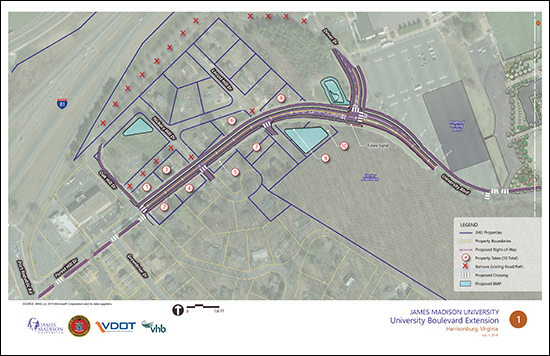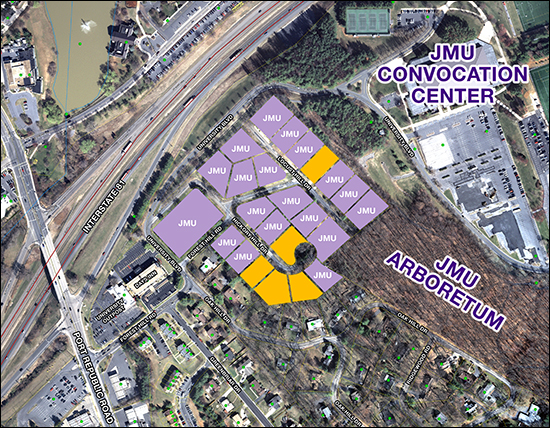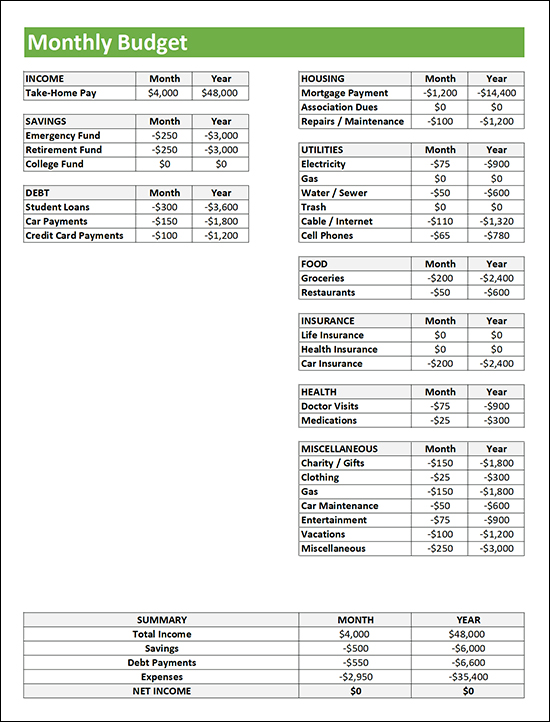How To Respond When A Buyer Reacts Irrationally To A Home Inspection |
|
 The purpose of a home inspection contingency is to allow a buyer to learn more about the property they have contracted to purchase -- and then to request repairs to the property if they discover new issues of which they were unaware when they contracted to purchase the property. For example -- a buyer contracts to buy a home for $250K and believes the electrical wiring and plumbing are all in good condition. The home inspection takes place and the inspector discovers that there are four plumbing connections that are leaking in the unfinished basement. It is then reasonable for the buyer to ask the seller to repair these plumbing leaks prior to closing. They agreed to pay $250K for a house that they did not believe had plumbing leaks -- and thus they request the seller restore the house to being a leak-free house. This is certainly an oversimplification of the matter, as there are often many discoveries during a home inspection -- of varying levels of seriousness or complexity -- but stick with me for now. Back up at our prior example -- rarely would a seller be disappointed, surprised, or unhappy if a buyer asked for plumbing leaks to be repaired. But what is a seller to do when a buyer starts to behave irrationally -- in a way that the seller believes no other buyer would certainly ever respond? For example --
I could go on and on. The point is -- sometimes buyers behave irrationally -- for whatever reason they have decided that they cannot / will not buy the house, and they are going to dig in their feet and make irrational repair requests until the seller finally caves and releases them from the contract. Or, rather, given the standard Virginia home inspection contingency, the buyer just terminates the contract on the basis of the home inspection even though their decision to do so was based on a view of the property condition (and of needed repairs) that is unlikely to be shared by any other buyer, ever. So, what in the world is a home seller to do in such a situation?
Of course, I hope this advice is absolutely never pertinent to you. May you never be in the midst of a home sale -- under contract -- just working your way through contingencies and excitedly anticipating a closing in the near future -- and then have the rug pulled out from under you by a home buyer with unreasonable expectations or demands. But if you do find yourself in this situation, try to move on quickly and be transparent with future buyers -- after getting angry, frustrated and discouraged, of course! | |
Maybe JMU Bought Those Houses To Straighten Out A Road? |
|
(click the map for a larger file) I'm not sure if it was the plan all along, but it seems JMU's acquisition (over quite a few years) of homes in the Forest Hills area has allowed it to now (potentially) partner with the City and Commonwealth to straight out the end of University Boulevard that has a big (slow) loop as it approaches the Days Inn. Here are the properties that JMU owns per my most recent accounting... (click the map for a larger file) The most recent development, as covered by The Citizen (Council takes next step toward major re-routing of University Boulevard) is that the City Council approved the Department of Public Works' plan to seek money from the Commonwealth of Virginia to accomplish this project. Here's how it would go down...
If this funding request is approved, construction on this realignment of University Boulevard would not be complete until December 2023. So, stay tuned, but don't expect any changes to the road in the immediate future. | |
How Many Bedrooms Does Your House REALLY Have? |
|
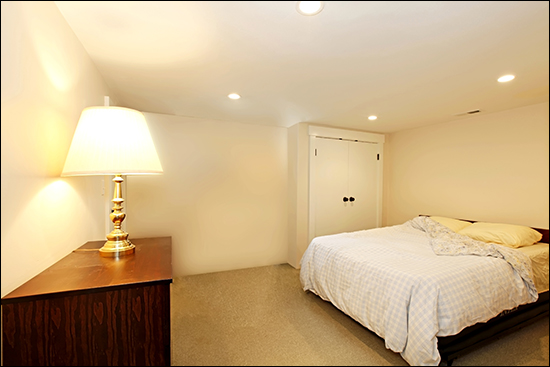 You don't have to be a math major to count bedrooms, right? Well, technically, that's true -- but counting bedrooms for real estate purposes can become a bit nuanced. Now, the basic rule of thumb for what makes a bedroom is that it needs a window and a closet. So -- if you have a room with a bed, where someone sleeps (regularly, or on occasion) but it does not have a window or does not have a closet, it might not be considered by Realtors, buyers or appraisers as being an actual bedroom. Now -- the National Appraiser Roster has all sorts of nuances surrounding this topic....
Wow. OK. Lots to consider there. So -- the short answer is that you can count your bedrooms based on whether they have windows and closets -- but it may require a bit more thought and analysis before we decide how many bedrooms we'll say that your home has when we put it on the market. Oh, and two final notes....
| |
Risk and Reward in Buying College Student Housing Rental Properties |
|
 If you are looking to purchase a rental property for your JMU student to live in while they are a student at JMU, there are two basic paths you could go down....
Option 1 -- A property in a traditional student housing neighborhood. These will allow the most students to live in the property and will maximize the rental income per dollar spent on the purchase. However, it will also expose you to a more turbulent segment of the market, as rental rates and sales prices of these properties can vary quite a bit over time as the supply of competing student housing ebbs and flows based on large complexes being built by student housing developers. You can find purchase options in this category here. Option 2 -- A townhouse in a community that has many owner occupants, some non-student renters and some student renters. Many of these will not allow as many unrelated students to live in the property (per zoning regulation or restrictive covenant) and will not provide quite as much rental income per dollar spent on the purchase price. However, they will be in segment of the real estate market that is much more predictable and less volatile from a rental rate and/or sales price perspective. You can find purchase options in this category here and here. I work with parents of JMU students each year who go down each path outlined above, each for different reasons. Most of the time, though, it boils down to their tolerance for risk or their desire for reward. It can also be related to their intended time horizon for owning the property. If you are interested in buying a rental property for your son or daughter to live in while they are at student at JMU, let me know. Oh, and you might also want to read up here... | |
High Temps, But Low Mortgage Rates Throughout Summer 2019 |
|
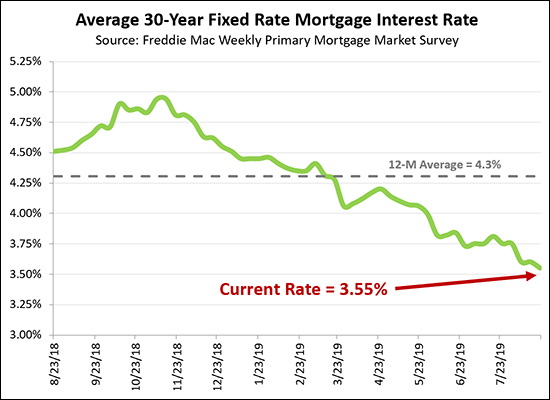 Mortgage interest rates kept dropping lower - and lower - and lower all summer long! The current average rate for a 30 year fixed rate mortgage is only 3.55%, well below the 12 month average of 4.3%. If we look back even further, we're approaching the lows of mid-2016... 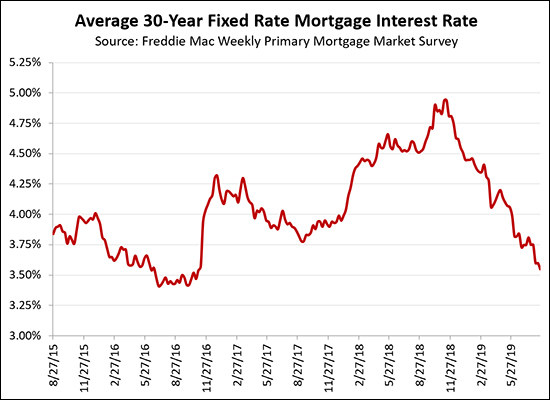 All of this adds up to VERY favorable times to be buying a house - in that you can lock in your monthly housing costs at some of the lowest long term interest rates ever seen. | |
Fall Is Not The Worst Season For Selling Your Home |
|
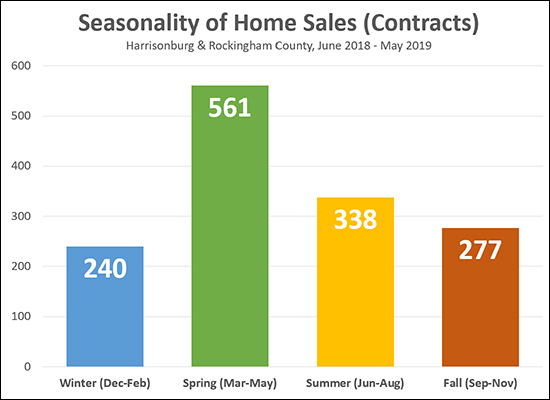 As is likely no surprise -- the busiest time for home sales (contracts) is SPRING -- by far! There is then a relatively large drop off from Spring to Summer. Somewhat surprisingly, it is not an enormous decline between Summer and Fall. So -- Fall is not the worst season for selling your home, but it is far from the best. Of note, the data above reflects the timeframe during which properties went UNDER CONTRACT -- not when they closed. Plenty of the Summer contracts turned into Fall closings -- but the 277 figure is a reflection of how many buyers made buying decisions (signed contracts) between September and November of last year. So....if you want to sell your home (and close on it) in 2019, you should be thinking about getting it on the market sooner rather than later. Fall is definitely a better time to sell than Winter! | |
How Big (in Square Feet) Is Your Home? |
|
 So -- are you trying to figure out the square footage of your home? Here are a few methods that are NOT necessarily going to give you the correct answer....
So, how do you really measure square footage? It starts outside the home! You'll need to measure the exterior dimensions of each level of your home -- and then subtract any open areas, such as the open space above a foyer. This measurement method, as odd as it may be, is what is used by nearly every appraiser, as it is how "gross living area" is defined by Fannie Mae, HUD, FHA, ERC and ANSI. As such, it is important that you're measuring the square footage of your home in the same way that nearly every appraiser and Realtor would be measuring it, so that you're comparing apples to apples when comparing the size (SF) of your home to another home that has sold or that is on the market for sale. And here's why I consider it to be an odd way to measure square footage....
| |
Should You Rent or Buy With a 2, 3 or 5 Year Time Frame? |
|
 Should You Rent or Buy With a 2, 3 or 5 Year Time Frame? Looking at two different price points for townhouses ($175K, $225K) a quick analysis would indicate that...
So, buy the townhouse, right? Well, sort of... The comparison above ONLY accounts for the monthly payments and does not account for...
So, let's look at it again, a bit more thoroughly... 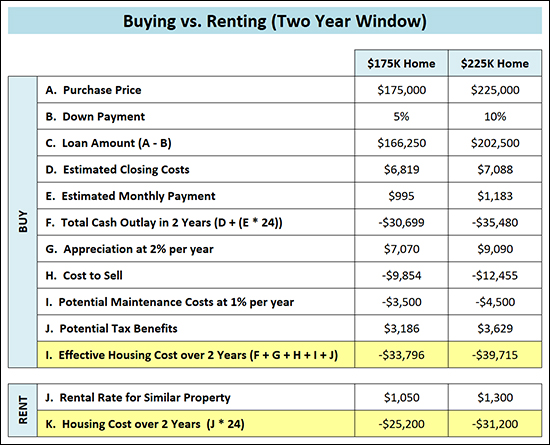 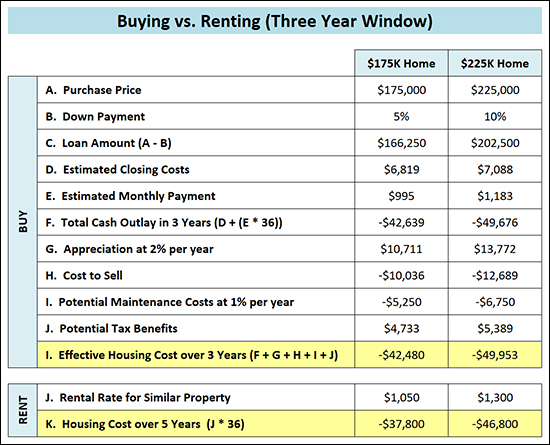 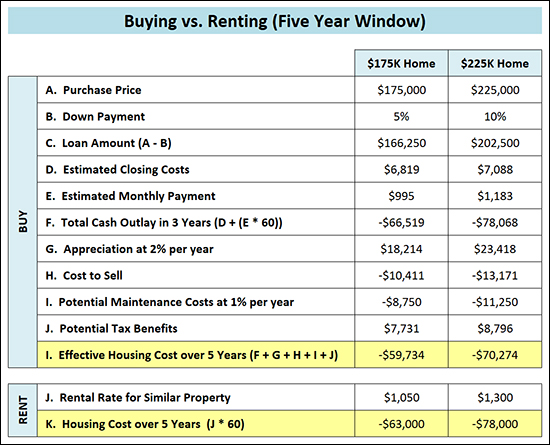 Above I have tried to account for ALL of those factors, and looking at a two year window, three year window and five year window. This analysis indicates that you should probably plan to be in your home for 5+ years if you want the total financial transaction(s) to be a net positive. That said, there are, of course, plenty of extenuating circumstances. Many people might buy a $175K house (or townhouse) even if they are planning to be there for only 3 years --- because they want their own home (not their landlord's), or to get in a certain neighborhood, or because of the tax benefits, etc. Every buyer's situation is different, and I'd be happy to help you run an analysis similar to those shown below if you're interested in analyzing your best housing move. | |
How To Strengthen Your Low Offer Without Paying More |
|
 If you are making a low offer, you can increase the appeal of your offer by strengthening your other offering terms.... DEPOSITS Make the largest deposit you are comfortable with so the seller knows you have money "on the line" and that you won't risk losing that money by attempting to walk away from the deal. CLOSING COST ASSISTANCE Sellers don't just look at the contract price --- they calculate their net proceeds based on the offer price and any credits or closing cost assistance. Only ask for assistance if you truly need it. FINANCING Provide as much detail as possible about your financing intentions, and always include a pre-approval letter. Sellers who believe you are capable of financing the purchase will be less hesitant as they consider other terms of your offer. And yes -- offer cash, a large pile of it, if you are able. :) PERSONAL PROPERTY Don't automatically ask for everything the seller intends to convey --- if you don't need them all, leave them out of the offer. Allowing the seller to keep their washer/dryer (for example) may make them more flexible in other areas. INSPECTIONS Having a professional inspect the property you are purchasing is usually a good idea; however if you only intend to do it for informational purposes, consider leaving it out of the contract negotiations and conducting it post-settlement. SETTLEMENT & POSSESSION If possible, cater your settlement date and the details of transferring possession of the property to the needs or wants of the seller. This can go a long way towards gaining seller flexibility on other contract terms. Finally, research the seller's context for selling. That information can be invaluable in negotiating a successful contract. | |
There Might Not Be Anyone To Blame For Urban Flooding in the Lake Shenandoah Watershed Area |
|
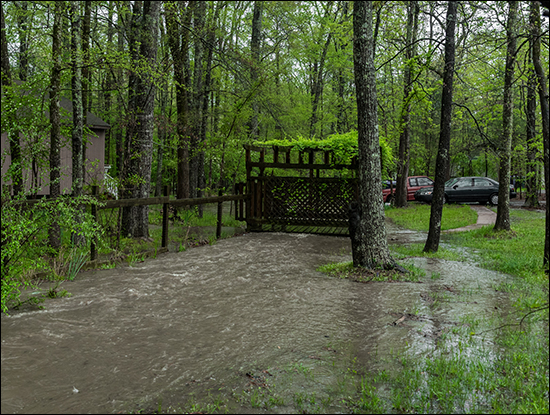 If your house, or street, or neighborhood floods during heavy rainfall events in the Lake Shenandoah watershed area, it likely seems that someone must be at fault - someone must have messed up - someone must be blamed for the drainage problems. But who is to blame? Many neighborhoods were developed just southeast of Harrisonburg over the past 20 years - and in each case, the developer would be told by the County how to develop the land from a stormwater perspective based on requirements from the State. So - if the State (Commonwealth of Virginia) creates guidelines, the County enforces them, and the developer implements them, who is to blame if your house, street or neighborhood is flooding? It is tempting to say that the developer must be at fault - but they were just doing what the County was telling them to do to manage stormwater. We could then blame County officials - but they were just doing what the state was telling them to do to manage stormwater. So, hmmm.... Here's a bit of further commentary from Mr. Miller (the County's attorney) at the public hearing held by the Board of Supervisors...
So, if everything was being done based on what the experts at the state were mandating - then it seems that local builders, developers and County officials aren't really the ones to be blaming for urban flooding. Yes, if all of these neighborhoods were developed today, the developer would be told by the County to do more to mitigate stormwater based on requirements from the state - but those guidelines and requirements were not in place when these neighborhoods were developed. A few other related notes...
If this topic interests you, consider attending the Work Session on the topic to be held this Wednesday (August 21, 2019) at 6:00 PM at the Rockingham County Administration Center. No action will be taken at the meeting, but it is an opportunity for further discussion and input. Also, as a refresher, these recent conversations are a result of the County's proposal to create a Stormwater Authority specifically for the Lake Shenandoah Watershed. The Authority could potentially spend around $3.2 million to improve the stormwater system by creating new detention facilities and increasing the capacity of ditches and pipes. If the cost of these potential improvements was divided evenly between the affected parcels, it would cost approximately $200 per year per parcel. Though... "Mr. Miller stated these are only estimates, because there are too many unknowns until engineering studies are conducted. Assistant County Administrator Armstrong noted that the $3.2 million cost is with no contribution from state or federal grants that the County may be able to obtain to offset costs." | |
Building A Budget When Buying A Home |
|
 Several buyers have recently asked me about how to determine how much they can and should spend on a home purchase. Those are actually answered differently... CAN -- How much you *can* spend will best be determined through a conversation with a mortgage lender. They will evaluate your income, existing required recurring debt payments, credit score, etc., to tell you the maximum that you can spend on a home. SHOULD -- How much you *should* spend is best determined by calculating what portion of your income you are comfortable spending on housing while still having enough left over for all of your other life expenses. In other words, a budget! I created the budget spreadsheet shown above (download it here) as a starting point for thinking this through. Let me know if you have questions about how to use this spreadsheet. And let me know if you'd like a recommendation on a local mortgage lender. | |
Choose A New Route to Starbucks (Scheduled Turning Restrictions on Port Republic Road) |
|
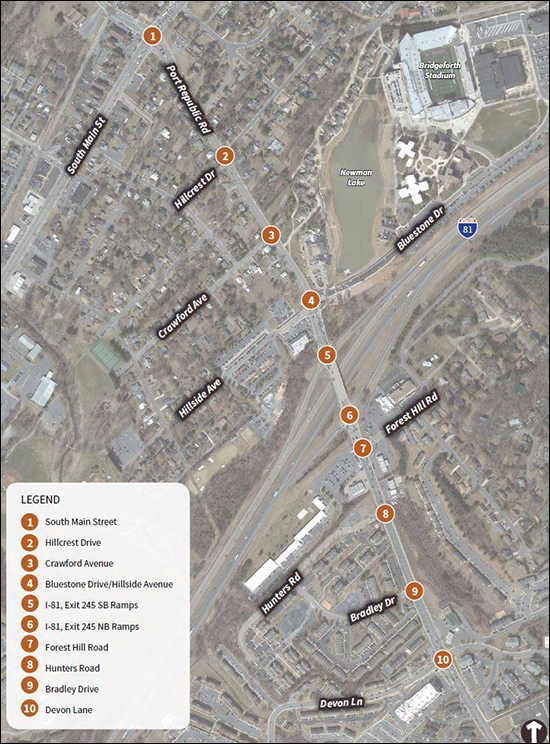 Do you drive towards JMU from the County, on Port Republic Road? Are you a regular customer at the drive through Starbucks each morning? You'll need to re-route slightly starting next week - or visit the other Starbucks directly across from JMU campus on weekday mornings starting next Monday. Starting this coming Monday, August 19, there will be three streets where left turns will be limited on week days between 7:00 AM and 9:00 AM and between 3:00 PM and 6:30 PM. Those streets are:
Left turns (which would have to cross two lanes of oncoming traffic) will no longer be permitted onto or off of the three streets above during the timeframes noted above. There will not be any turning restrictions on weekends. Some further notes from the City of Harrisonburg...
There are options, though, so maybe you can get your drive through Starbucks fix via Bradley Drive, one turn earlier on Port Republic Road?
And yes, the City knows these changes won't be convenient for some folks, but...
Click here to read more about the Port Republic Road corridor study that was conducted last year. | |
What If You Could Build A Duplex On Every Single Family Home Lot? |
|
 What if, on any single family home lot, you could build a duplex -- or even a townhouse! Would that help more affordable housing to be built? Would that upset existing single family home owners? Oregon is giving it a try! :-) From NPR... Some excerpts of interest follow...
Read the entire article for further commentary and perspectives... | |
Summer Is Fading Away. Home Sales Are Not. |
|
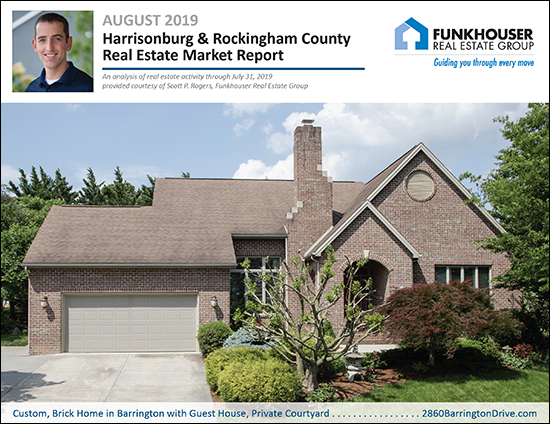 Summer is here! Oh wait, summer is gone!? Once that first week of August hits, it seems it's almost time for school to start again. Where did the summer go!?! While I ponder how another summer flew by so fast, let's take a few minutes to reflect on the state of our local housing market. But first - the beautiful home pictured above is this month's featured home - a spacious upscale home in Barrington with a finished basement, guest house and private courtyard! Check out the details at 2860BarringtonDrive.com. Now, onto the data! Download the full 28-page market report as a PDF, or read on... 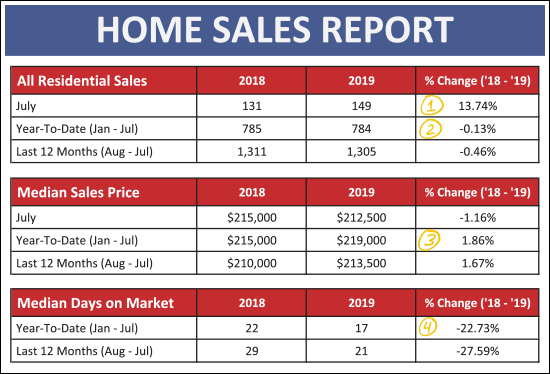 As shown above, July was a strong month for home sales...
Diving slightly deeper, let's see how detached homes compared to attached homes. An "attached home" is a duplex, townhouse or condo... 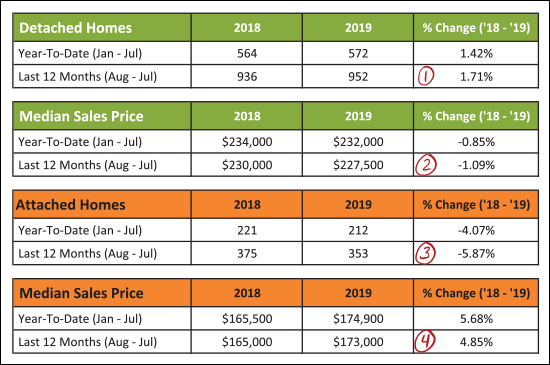 As shown above, there are some differences in these two broad segments of our local market...
And just how did this past July compare to some other months of July? 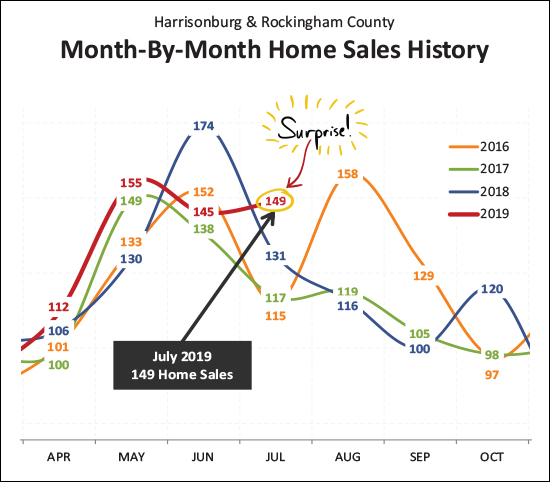 This was a bit of a surprise to me! June home sales were rather slow compared to previous months of June. I didn't anticipate that a slower June would so quickly translate into a faster paced July - but wow! Looking back at the past three years we have seen 115, 117 and 131 homes sales during July. This year it was 149 home sales! An impressive showing for buyers in the local marketplace! And here's how that strong month of July contributed to the overall year... 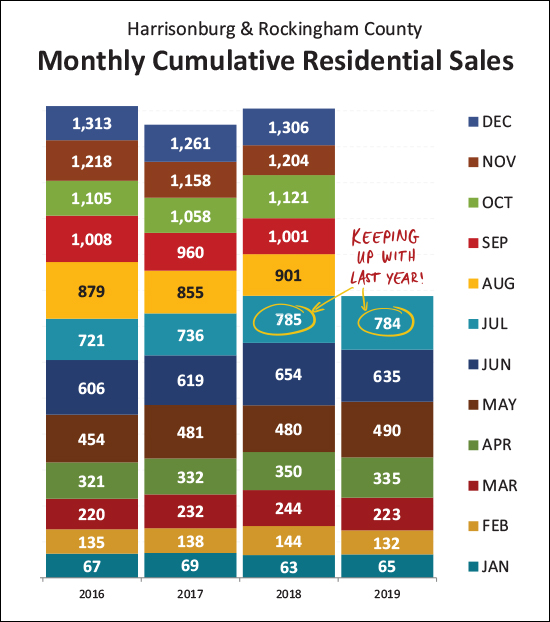 If we were a bit behind as of the end of last month (635 vs. 654) we just about (just about!) caught back up in July -- as there have now been 784 home sales thus far in 2019 compared to 785 last year. it would seem we'll probably make it back to around 1300 home sales this year. And now, let's step back a bit... 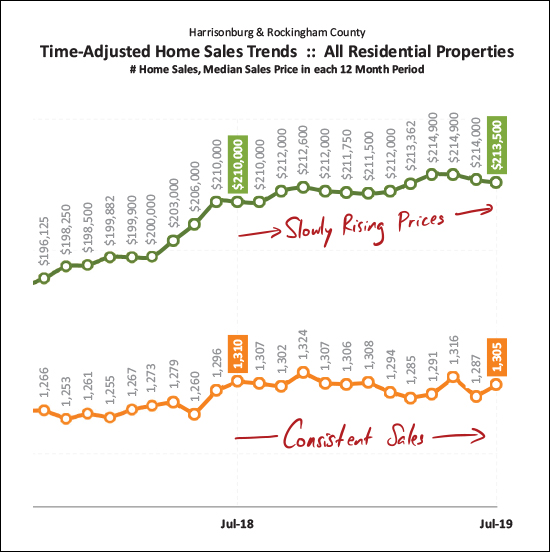 This is the slooooooooowest moving graph ever - it looks at a rolling twelve months of sales data. Here, though, we see that the general trend is a consistent-ish pace of home sales -- and slowly rising prices. And when we look for some overall indicators just for detached homes... 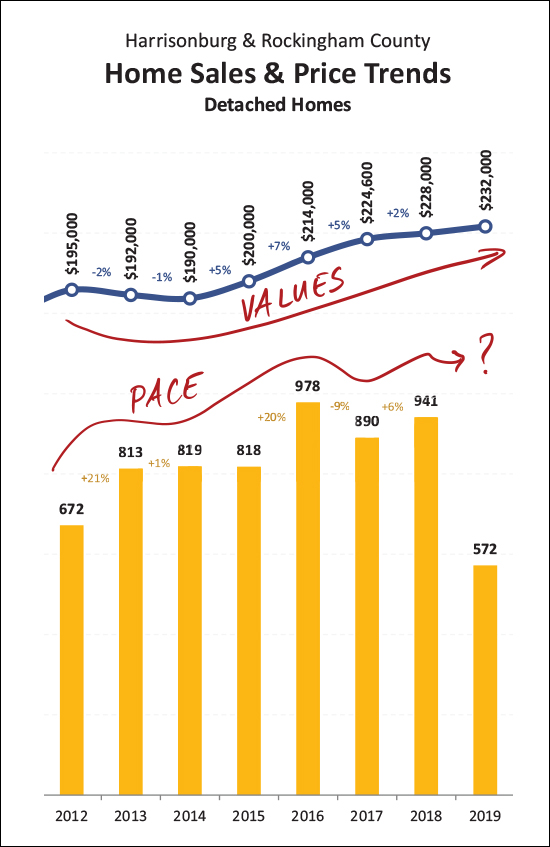 This is where we see (above) that despite some year to year turbulence as to the pace of home sales, we're seeing overall increases in sales prices all the way back to 2014. Some years (2015, 2016, 2017) have been larger increases than others (2018, 2019) but it has followed the same general trend. So, what's next? 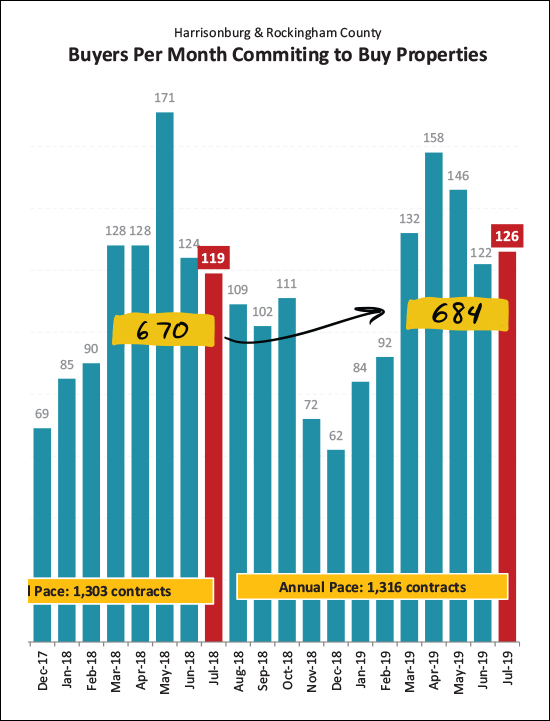 Well -- it would seem we are likely to see another strong month of home sales in August. After all, we saw an uptick (from 119 to 126) in July contracts, and over the past five months there have been 684 contracts signed, as compared to only 670 during the same months last year. How, though, will those contracts come together with such limited inventory? 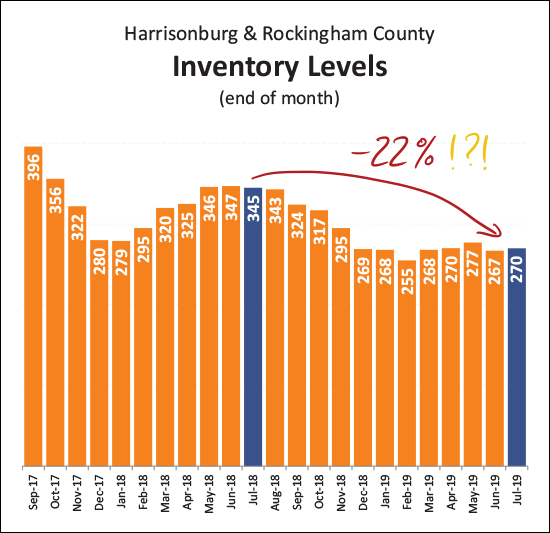 That is, of course, an excellent question! Inventory levels have fallen 22% over the past year. This means today's buyers are finding fewer and fewer options when looking for a home to buy at any given time. That said - a relatively consistent number of homes are selling - so a buyer might just have to be a bit more patient, and then be ready to jump quickly when the right house comes on the market. And one last note about mortgages and financing... 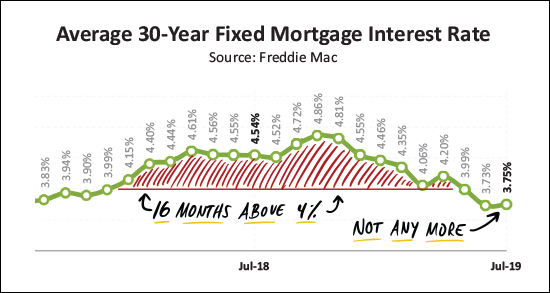 In case you missed it, today's buyers are locking in below 4% on 30 year fixed rate mortgages! We went through 16 months with rates above 4%, and we have now been back below 4% over the past few months. Anyone who locked in at 4.25%, 4.5%, 4.75%, etc., still has a wonderful long-term fixed rate mortgage interest rate -- but 3.something? Wow! I'll wrap it up there for now, with a few closing thoughts...
Until next time, have wonderful remainder of your summer, and a great start to your school year if you or someone you know will be getting back to the classroom this month! | |
Should You List Your Home in August or September or October? |
|
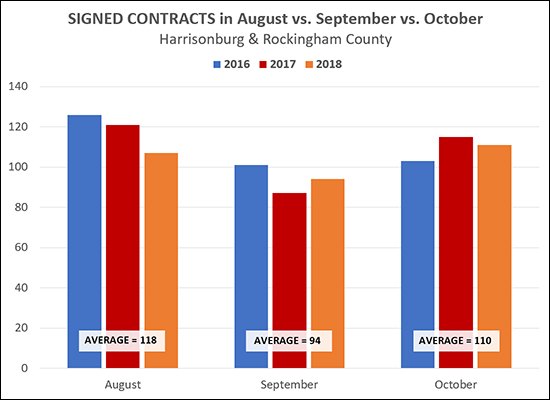 Generally speaking, you should list your home sooner rather than later. As shown above, we are likely to see a declining number of buyers signing contracts between August and September - though then a slight increase again in October. If you want to sell your home in the next few months, let's meet SOON (!!) to start discussing market value and any preparations you need to make in your home before putting it on the market. | |
If You Are Not Able To Buy Quite Yet Should You Still Start Looking At Homes? |
|
 Some buyers are close -- so close -- but not quite in a position to be able to make an offer yet on a house. It might be a matter of a few weeks -- or a month or two -- before you are able to actually sign a contract. This might be because you are waiting for a new job to start, or to finish paying off your car, or any number of other reasons. So -- if you're not able to make an offer on a house quite yet, should you still start looking at homes? Yes and no. YES - you should start looking at homes...
Understanding all of these things will help you be a better prepared buyer when you are actually ready to buy. NO - you should not start looking at homes...
So - for most buyers, I recommend "yes, up to a point". Let's start looking at homes that would be of interest if you were ready to sign a contract today. Let's build that context to allow you to understand your segment of the market. Let's get a sense of how often homes of interest will become available - and how quickly they go under contract. And then, after we have built somewhat of an understanding of the market, it will be your call as to whether to continue to look at homes that are not likely to actually be available for you to buy once you are able to do so. So, in conclusion - even if you are a few weeks or a few months out from being ready and able to sign a contract to buy a home, it is not necessarily too early to start going to see some houses. | |
Arranging the Timing and Logistics of Selling, Buying and Moving |
|
 Moving from one house to another is tough work! Even tougher (sometimes) is arranging the timing and logistics to work well for all parties. If you're selling a house in order to buy a house, it's possible that...
The spot for you to be can be somewhat easier -- you could stay at a hotel or with a friend for a night if needed. It's decidedly harder to put all of your belongings in the hotel room or in your friend's house. The options, generally speaking, are...
If none of these are possibilities -- I have even had some clients who had to put everything in storage, just for a few days -- and then move it out of storage into the new house. Again - even moving is tremendously hard - but arranging for it within the tight confines of closing timelines and when you do and do not have access to the old house and new house can make it even more difficult! | |
Sometimes Buyers Will Find It Difficult To Make Rational Decisions About Home Inspection Findings |
|
 Buying a house can be an enormous decision - full of plenty of emotions - anxiety, apprehension, excitement and much more! Buy a house is likely to be one of the largest financial decisions you will ever make - AND you are making a decision (where you will live) that will affect countless other aspects of your life, likely for many years to come. So, are you good at making difficult decisions in a highly emotional state? Many people find that to be difficult! Let's imagine this scenario -- you're buying a $245,000 home and you are SO excited to buy it because if it's charm, character, location, and so much more! It is within walking distance of the downtown scene - and even though it is an older home, it seems to have been well maintained and updated. But then, you do the home inspection and you find out that the ___ will need to be replaced in the next few years. Technically, this could be any number of items -- heating system, roof, appliances, etc. What to do...what to do!? Perhaps it is going to cost another $5,000 to make this update - and the seller is not willing to adjust the contract terms based on your inspection findings because, after all, the ____ is still working properly now. So - do you throw the whole purchase out the window? You're going to have another $5,000 of costs within the next few years!? The seller should be willing to negotiate to cover some of that cost!? Is your "really good decision" now actually a "really bad decision"?!? This advise is not prescriptive to all situations, but I would encourage you to consider the big picture as rationally as possible. You are about to buy a home that is (in my fictional scenario) going to totally change your life. It's a home you can see yourself living in for 10 - 15 years. You look forward to the memories formed in the house, the places you can walk and experience based on its location, the opportunity to have a garden in the backyard, and so much more! A question that you could then ask yourself would be whether you'd pay $250K for this awesome, amazing, perfect, life changing house and opportunity, instead of the $245K you have contracted to pay. If so, and if you'll have cash available to make the needed upgrade to the ____ sometime in the next few years, then maybe it's not really a terrible idea to continue with the purchase despite the newfound information about the condition of the house and despite the seller's unwillingness to assist with it financially. Again - this is not generic advice of "don't worry about the issues that come up in the inspection" - but more of an encouragement to consider the big picture of what you are buying, why you are buying it, what it is worth to you, etc. | |
Consider Purchasing a Home Warranty Depending on the Age of the Systems of the Home |
|
 What is a Home Warranty? A home warranty one-year service agreement that covers the repair or replacement of many major home system components and appliances that typically break down over time due to normal wear and tear. One company that many of my clients have used for a Home Warranty is American Home Shield. They offer several plan options:
If you're buying a brand new home, you likely don't need a Home Warranty. If you're buying a home where the heat pump, appliances and water heater have just been replaced, you probably don't need a Home Warranty. If you're buying anything else, you should consider a home warranty. | |
Scott Rogers
Funkhouser Real
Estate Group
540-578-0102
scott@funkhousergroup.com
Licensed in the
Commonwealth of Virginia
Home Search
Housing Market Report
Harrisonburg Townhouses
Walk Through This Home
Investment Properties
Harrisonburg Foreclosures
Property Transfers
New Listings

